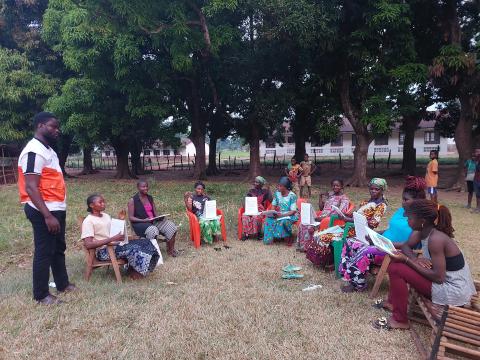DR Congo: GAINS Project Resumes – A Breath of Hope Amid Humanitarian Uncertainty

By Jean Baptiste Mirindi, SBCC Advisor
After several months of interruption due to a funding suspension, the GAINS project (Growth through Agriculture, Nutrition and Sustainable Development) has finally resumed its activities in the Kasaï province. This relaunch brings a wave of relief, renewed determination, and fresh energy, both for the project staff and for the communities it serves.
From the very first day of the restart, enthusiasm was tangible on project sites. Staff members expressed their joy at being reunited and at having the opportunity to once again dedicate themselves to supporting the most vulnerable.
“This project is not just a job; it’s a lifeline for the communities we serve,” shared Fils Bulabula, Health and Nutrition Team Leader at World Vision Kasaï, during a reactivation session of the Care Group with the Femmes-leaders.
The GAINS Health and Nutrition programme currently supports over 2,400 pregnant and breastfeeding women, training them in essential nutritional practices to ensure healthy child development from conception to two years of age. These Femmes-leaders have the vital role of relaying this knowledge to their neighbours, thereby building a grassroots network of awareness and prevention.
However, behind this hopeful restart lies a more alarming reality. The project had been put on hold due to budget cuts imposed by the United States Agency for International Development (USAID), the programme’s main donor. This decision has had significant consequences: in an already critical humanitarian context, the suspension left thousands of families without essential support in nutrition, food security, and access to clean water.
Through GAINS–TUYA KUMPALA, a five-year programme for resilient food security implemented by Mercy Corps, World Vision, and local partners, humanitarian actors are striving to reverse malnutrition trends, strengthen livelihoods, and promote sustainable hygiene practices. But uncertainty around international funding threatens to undermine these efforts.
“We are glad to resume our activities, but we are also aware that without sustained funding, the progress we make could collapse. There is a real risk of communities, especially children, falling deeper into hardship. This is a call to financial partners to support us with more resources to meet the ever-growing needs,” warned Fils Bulabula.
As humanitarian needs in the DRC continue to rise, budget cuts are hitting hardest in regions already affected by hunger, poverty, and health crises. More than ever, it is vital to underscore the importance of stable and predictable funding for development and resilience programmes.